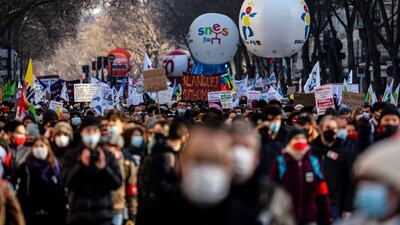Teachers across France have gone on strike blaming the government for placing the education system in an “indescribable mess” with its handling of the Covid-19 pandemic.
Classrooms across the country were left empty on Thursday as educators walked out to demonstrate their disapproval of coronavirus-linked disruptions to pupils’ learning and ever-changing isolation rules.
Less than two weeks after the winter term started, teachers said they are already exhausted by the pressures of surging Covid-19 cases.
France is in the eye of the coronavirus storm sweeping across the continent, with new infections topping 360,000 a day in recent days, driven by the highly contagious Omicron variant.
Disgruntled teachers are demanding clarifications on Covid rules and want ministers to offer them more protection against the virus, such as extra face masks and tests, to help schools deal with the strain.
Since January 6, authorities have already imposed two changes to the rules on testing schoolchildren.
The SNUIPP teachers’ union warned discontentment is rising among French teachers. It said it expected three quarters of the teaching force to take part in the nationwide strike, resulting in the closure of around half of schools.
“The situation since the start of the January school year has created an indescribable mess and a strong feeling of abandonment and anger among school staff,” the union said.
Jean-Michel Blanquer, the French education minister, acknowledged that January has been a “tough” month for schools.
His ministry counted 50,000 new Covid cases among pupils in “recent days” and 10,553 classes shut down because of the virus. The figures are expected to worsen in the coming weeks.
Isolation period slashed as UK on road to 'restore freedoms'
Meanwhile, Britain’s Health Secretary Sajid Javid announced the country's mandated self-isolation period for people in England who have tested positive for Covid would be cut from seven to five days, in a significant step to easing pandemic restrictions.
Addressing Members of Parliament in the House of Commons, he said data from the UK Health Security Agency showed “that around two thirds of positive cases are no longer infectious by the end of day five”. The government agency is responsible for public health and responses to infectious disease in England.
“After reviewing all of the evidence, we’ve made the decision to reduce the minimum self-isolation period to five full days in England,” Mr Javid told MPs. “I’d urge everyone to take advantage of the capacity we have built up in tests so we can restore the freedoms to this country while we’re keeping everyone safe.”
As Covid numbers surge across Europe, governments are having to grapple with the prospect of more restrictions.
The Netherlands’ new government is set to make a decision on whether to keep the nation in lockdown, following a week of record-breaking cases.
Dutch ministers will meet in The Hague on Thursday to decide whether to extend the shutdown beyond January 19.
Spain is also grappling with a worsening crisis, with more than a quarter of its ICU patients being treated for Covid-19 in 26 provinces.
Mandatory enlistment for nurses
In the Swiss region of Grisons, authorities have told people who have apprenticeships, master’s degrees and doctorates in nursing to make themselves known if they are not already practicing.
The area has emerged as a hotspot in Switzerland’s coronavirus crisis which has resulted in record infection numbers.
Omicron is thought to be behind up to 95 per cent of cases in Grisons, where hospitals are stretched.
Unveiling the new tactic to fight the crisis, the canton cited a section of Swiss law which allows authorities to call people up to fight infectious diseases. It did not say whether there would be a penalty for failing to register.
“In the current exceptional circumstances, it is unavoidable that health and care facilities will have to deal with personnel shortages,” it said.
“We have to assume that the strong increase in coronavirus cases will push medical care and nursing capacity to their limits.”
Meanwhile, France has said it will lift its ban on tourists from the UK.

The restriction sparked chaos for many Britons when it was brought in just before Christmas.
From Friday, fully-vaccinated travellers from across the Channel will be allowed into France if they have evidence of a negative Covid-19 test taken within 24 hours of departing from the UK, the French transport minister Jean-Baptiste Djebbari said.
UK Transport Secretary Grant Shapps said Mr Djebbari told him the decision to roll back the ban was due to “the UK’s falling infection rate”.
The requirement to isolate on arrival will also be scrapped.
Unvaccinated travellers from Britain will continue to need a “compelling reason” to gain entry to France.
The lifting of the tourism ban will open the door for Britons to go skiing in the French Alps, an annual event for some which has been thrown into chaos over the past two years due to the pandemic.
The World Health Organisation has warned that more than half of Europeans will be infected with the highly transmissible Covid-10 variant in the next six to eight weeks.
Global health leaders said the continent entered the new year under the strain of “intense pressure” due to the emergence of Omicron, which is fuelling record Covid cases. More than seven million infections were declared across Europe in the first week of the year.
They also said the virus cannot yet be called an “endemic” disease.














